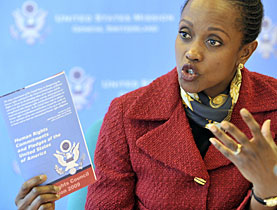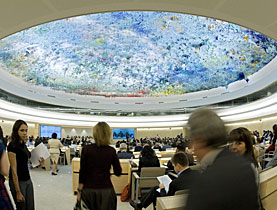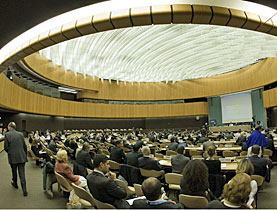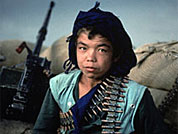US returns to the human rights ball game

A new era starts on Monday at the United Nations Human Rights Council in Geneva: for the first time the United States is attending as a fully fledged member.
Until now it had simply been an observer watching from the sidelines. But the presence of US Undersecretary of State for International Organizations Esther Brimmer should send a message that under the administration of Barack Obama the US is back in the ball game.
The attendance of Brimmer, a member of the US delegation to the former UN Commission on Human Rights, may allay disappointment that the US has not yet appointed a new permanent representative to Geneva.
There are some who would even like to see the appointment of a separate US ambassador to the Human Rights Council much as there is a separate one for the World Trade Organization (WTO), on the grounds this would send a stronger message about US intentions.
That decision will be up to Secretary of State Hillary Clinton and Michael Posner, Obama’s nomination to head the State Department’s Human Rights bureau when and if he is confirmed by the Senate in coming weeks.
Change of heart
Under the Bush administration, the US chose not to participate in the Human Rights Council on the grounds that it was dominated by countries like Cuba, Egypt and Pakistan, which it regarded as notorious human rights violators, who focused exclusively on violations by Israel.
The Obama administration on the other hand, has taken the view that the US cannot exercise leadership in a group to which it does not belong. The election in May of the US as a new Council member may not alter the political makeup of the 47-member body but it has sent a positive signal to human rights defenders around the world.
“Not enough”
“It’s not enough for the US to stand up and apologise for Guantanamo,” said Adrien-Claude Zoller of the group Geneva for Human Rights.
“It is US policy that must change – toward countries like Egypt and Pakistan.
“The problem is that Egypt is a key player in the US effort to resolve the Middle East crisis and Pakistan is perceived as a US ally in the war in Afghanistan. As long as this remains so, human rights violations in both countries will be overlooked.”
Rashid Mesli of the Geneva-based NGO, Alkarama, which denounces human rights violations in the Arab world, agrees. He fears the US is too conciliatory toward dictators.
“[Egyptian President Hosni] Mubarak’s reception in Washington was very disappointing to us. People know their dictators are backed financially and otherwise by the West and remain in power thanks to the West. So Obama’s words have given us great hope but it remains to be seen what actions he will take.”
Winds of change
But William Shultz of the Center for American Progress believes the winds of change are already blowing.
Shultz, a former executive director of Amnesty International USA, cites President Obama’s address to the Muslim world during a visit to Cairo in June, the appointment of a representative for Muslim Affairs and the decisions to close Guantanamo and outlaw torture.
“Of course Obama is under pressure to focus on issues that are paramount to Americans right now, health care, the economy, our presence in Afghanistan,” he said. “But I would argue that human rights affect all those issues and the US cannot achieve its strategic goals by ignoring human rights.”
In any case, says Zoller, “change won’t happen in Geneva. It will happen in Washington with Secretary of State Clinton speaking directly to those countries violating human rights and putting pressure directly on them.”
Another way to do this, Zoller believes, is to put pressure on Switzerland to make it easier for victims of human rights violations to come to Geneva and testify before open council sessions.
“One of the main problems facing the council today is the absence of actual victims. Fewer and fewer local NGOs are coming from Africa, South America and Muslim countries.”
Pamela Taylor, InfoSud Human Rights Tribune/swissinfo.ch
Swiss Foreign Minister Micheline Calmy-Rey presented the concept of the Human Rights Council in March 2004 to replace the widely discredited and highly politicised UN Human Rights Commission created in 1946. The UN officially accepted the idea in September 2005.
The first session of the UN Human Rights Council took place in June 2006 at its headquarters in Geneva. The Council reports directly to the UN General Assembly.
It consists of 47 member states, which are selected with absolute majority by the UN General Assembly. It meets at least three times a year and can also hold special meetings to discuss crisis situations.
The 27 seats of African and Asian countries heavily outvote western countries, which hold seven seats on the council.
Its 12th regular session runs from September 14 to October 2.
One of the issues on the agenda at the council session will be the report of the UN fact-finding mission on Israel’s offensive in the Gaza Strip last winter.
The council “strongly condemned” Israel’s actions in January while they were still under way, but 13 European countries, including Switzerland, abstained from the vote.
At the same session the council also voted to probe Israeli human rights violations, but subsequently broadened the scope of its inquiry to deal with “all violations”.
Also up for discussion is a report from the High Commissioner for Human Rights on the main concerns of her office in Gaza from the start of the Israeli operation until April 10.
A human rights mission held hearings in the Gaza Strip and in Geneva in June and July, during which witnesses and experts from both sides gave accounts of their experiences.
Israel did not allow the investigators to enter the country, called their mandate “one-sided”.

In compliance with the JTI standards
More: SWI swissinfo.ch certified by the Journalism Trust Initiative




You can find an overview of ongoing debates with our journalists here. Please join us!
If you want to start a conversation about a topic raised in this article or want to report factual errors, email us at english@swissinfo.ch.